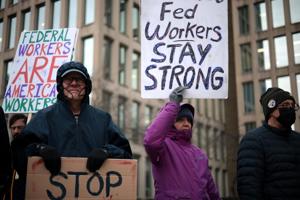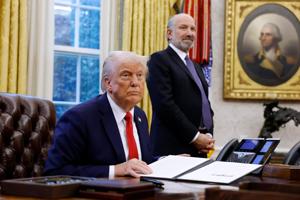Wherever there’s a sudden surge of councilmember concern about a particular bill in the Wilson Building, there’s sure to be lobbyists nearby.
It’s an iron rule in local politics: The more alarmed lawmakers grow about a highly technical piece of legislation in the moments before a vote, the more they’ve heard from the influence peddlers paid big bucks to worry about the details for their clients. So when several councilmembers started asking increasingly pointed questions Tuesday about a bill regulating food delivery drivers, Loose Lips was hardly surprised to learn that the big companies set to be affected have started throwing their weight around.
“I will say, transparently, I thought this was an innocent bill,” Ward 5 Councilmember Zachary Parker said during the Council’s (very lengthy) breakfast meeting. “But then I got a flurry of emails and text messages and phone calls.”
The bill in question is from Ward 1 Councilmember Brianne Nadeau, titled the “Carrier-for-Hire Oversight and Enforcement Act of 2024,” and it has alarmed the major app-based delivery services in the city: DoorDash, GoPuff, GrubHub, Instacart, and Uber Eats. The bill is chiefly aimed at allowing the Department of For-Hire Vehicles, which was created to manage the explosion of rideshare companies in the city, to monitor delivery drivers as well. The Council acted several years ago to give DFHV the power to enforce traffic laws against delivery drivers who were double-parked or idling in the street, but the bill goes a step further and also requires these drivers to register with the department and wear markers identifying which service they work for.
That all might sound reasonable enough, but tech companies such as these have historically resisted attempts at government regulation. And lobbying records show that the firms have deep enough pockets to hire the sort of connected people who can get the Council’s attention. DoorDash has hired Corey Arnez Griffin, former chief of staff for At-Large Councilmember Kenyan McDuffie, while Instacart pays Max Brown, a top donor to and former political appointee of Mayor Muriel Bowser. Uber, meanwhile, employs both its own internal lobbyists and Jon Bouker of the influential firm ArentFox Schiff.

The bill still advanced on a first vote Tuesday, narrowly surviving an effort by Parker to table the legislation. It was McDuffie, however, who threw up some of the fiercest opposition, relying on talking points that echoed those of the lobbyists quite closely.
His displeasure centered on three items, in particular: the bill’s potential applicability to non-app-based delivery services, its requirement that drivers carry vehicle insurance policies, and Nadeau’s handling of the overall legislative process. He expressed no small amount of dissatisfaction that his Ward 1 colleague was advancing a bill touching on food delivery, which he claimed was solely within the jurisdiction of his Committee on Business and Economic Development, and that Nadeau had broadened the bill’s scope beyond its origins codifying DFHV’s traffic enforcement powers.
Nadeau won oversight of DFHV away from McDuffie during the Council’s most recent reorganization two years ago, so it’s not entirely clear why this jurisdictional question has become such an issue—McDuffie has frequently legislated on food delivery issues, but LL isn’t aware of any rule barring Nadeau from doing the same. When Nadeau offered to make changes in response to some of McDuffie’s concerns, such as dropping the insurance requirement, this did little to placate him.
“We’re literally legislating on the fly at a legislative breakfast without having afforded businesses that will be impacted the opportunity to weigh in on this,” McDuffie said. “This is not how we should do business or legislate.”
Of course, the Council operates this way all the time. (It’s a persistent complaint from activists, journalists, and lawmakers themselves that the Council hashes out so many important details at these semiprivate, unrecorded breakfast meetings, but nobody has ever done anything to change that.) But McDuffie is at least correct that the bill has evolved quite a bit over the course of the legislative process. Nadeau smushed several bills together on related subjects in her committee, though she did hold a hearing on them in February and put together a committee report on the new version last week.
Accordingly, McDuffie’s argument was that Nadeau essentially waited until the end of the Council’s session to bring this bill up for a vote, robbing the businesses whispering in his ear of the opportunity to shape it. Lawmakers can either accept the legislation as is now, or it will have to wait until the new year. The Council must vote to approve the bill twice, during two separate meetings, in order for it to pass; the body’s last meeting of the year is set for Dec. 17.
“A tactic could be for any member of this Council to wait until the end of a Council period to do whatever you want, whether or not it’s consistent with the rules,” McDuffie said in a huff. “You would be OK with that?” he pressed Chair Phil Mendelson—the latest tiff between the two during one of these breakfast meetings. Mendelson, for his part, deferred to the rest of the Council to ask if they’re willing to vote the bill down or kick it back to committee, effectively killing it.

“I’m not going to take any of that personally, even though it was really rude,” Nadeau retorted. She noted that her staff has been working with the delivery services on edits to the bill, so it’s not as if they’ve been cut out of the process. Among other things, Nadeau believes she was able to clarify that the legislation is unlikely to trip up delivery drivers for companies like Amazon or Giant, which use company-owned vehicles. The legislation focuses on the DoorDashes and Instacarts of the world, whose drivers use their own means of transportation. What’s more, she feels this sort of back-and-forth between the first and second vote on legislation is “common practice,” not any sort of nefarious effort on her part.
“Think about the people that are jumping out of the car to drop your package on the porch and parking crazy,” Nadeau said. “They should be properly registered, and that doesn’t limit anyone from making a living. It doesn’t limit anyone from getting their deliveries. It’s just a matter of making sure we have the proper regulations and oversight in place.”
The companies have been busy claiming the opposite, of course. Chad Horrell, a top DoorDash lobbyist, told Nadeau’s committee in the February hearing that increased parking enforcement would force drivers to “circle the blocks around busy commercial corridors looking for parking” or even cause them to turn down assignments in the city. And he argued that the requirement that drivers wear identifying markers would “exacerbate the fears of delivery workers who view themselves as a particularly attractive target” for carjackings and robberies. Horrell even organized a petition of 162 of the company’s drivers making similar claims.
LL appreciates these concerns, but is the alternative that the city simply gives up on enforcing its parking laws or regulating these (sometimes dangerous) drivers entirely? It’s the companies themselves that have created these precarious conditions for workers, forcing them to zoom around the city if they have any hope of earning a decent wage, so it’s pretty rich for them to turn around and demand officials just go along with the status quo.
“It’s not like these companies are hiring [drivers] with health benefits and retirement funds,” Ward 6 Councilmember Charles Allen said. “They’re not even employees. They’re contract workers. They don’t have benefits and protections in the same way that any other employee would. So the corporations naturally want to push back on trying to create rules and regulations around what they have to do, and just push it all back onto that gig worker who’s just hustling. We’re all trying to help the person who hustles, but, for whatever reason, we don’t like to put anything on the company that, frankly, takes advantage of a lot of these folks.”
Gig work companies from Uber and Lyft on down have indeed gotten their way on pretty much everything they want in D.C. for the past decade, thanks in no small part to their aggressive lobbying operations. This has frequently involved co-opting workers themselves into this effort, as DoorDash did in this instance, manipulating their dependence on their employers to provide sympathetic voices for lawmakers. (Empower, the new arrival on the rideshare scene, has tried using a similar playbook, but has so far been stymied by the courts.)
Legislation to give these workers full employment rights might reverse some of this dynamic, but efforts to do so around the country haven’t found much purchase in the face of these companies’ influence. Given the way the delivery services have pushed lawmakers around on even some minor attempts to regulate them, it’s hard for LL to imagine things meaningfully changing in D.C. anytime soon.
Recommended Stories
!function(f,b,e,v,n,t,s)
{if(f.fbq)return;n=f.fbq=function(){n.callMethod?
n.callMethod.apply(n,arguments):n.queue.push(arguments)};
if(!f._fbq)f._fbq=n;n.push=n;n.loaded=!0;n.version=’2.0′;
n.queue=[];t=b.createElement(e);t.async=!0;
t.src=v;s=b.getElementsByTagName(e)[0];
s.parentNode.insertBefore(t,s)}(window, document,’script’,
‘https://connect.facebook.net/en_US/fbevents.js’);
fbq(‘init’, ‘560647738994257’);
fbq(‘track’, ‘PageView’, {“page_title”:”Nadeau\u2019s Push to Regulate Delivery Drivers Draws Fierce Pushback from Gig Work Companies and Their Lobbyists”,”user_role”:”guest”,”event_url”:”https:\/\/washingtoncitypaper.com\/article\/754429\/nadeaus-push-to-regulate-delivery-drivers-draws-fierce-pushback-from-gig-work-companies-and-their-lobbyists”,”post_type”:”post”,”post_id”:754429});
#Nadeaus #Push #Regulate #Delivery #Drivers #Draws #Fierce #Pushback #Gig #Work #Companies #Lobbyists











Beauty Fashion
This actually answered my problem, thank you!